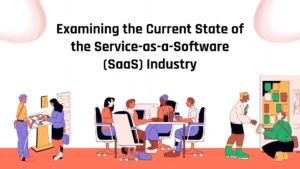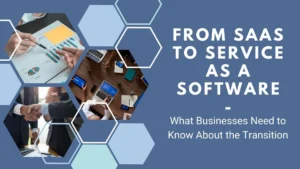In recent years, Software as a Service (SaaS) has been the dominant model for delivering cloud-based applications to businesses and consumers. As the landscape of digital transformation grows, a new evolution is emerging in SaaS, known as “Service as a Software – SaaS,” driven by artificial intelligence (AI). This shift isn’t just an upgrade; it’s a reinvention. AI is integrating capabilities that allow SaaS solutions to become more autonomous, adaptive, and insightful, bringing significant advancements to every industry relying on software solutions.
Understanding “Service as a Software – SaaS”
“Service as a Software – SaaS” is the next generation of SaaS where AI and machine learning technologies transform traditional software solutions into intelligent, proactive services. Unlike traditional SaaS, which focuses on software accessibility, Service as a Software emphasizes providing users with an intuitive, efficient, and automated experience by embedding AI capabilities into the core functionalities of SaaS products.
Key Drivers of the AI-Driven SaaS Transformation
1. Enhanced Customer Experience with AI Personalization
One of the most revolutionary impacts of AI in SaaS is its ability to personalize user experiences. By using machine learning and data analytics, SaaS solutions can understand user preferences and behavior. AI-powered SaaS personalized recommendations, customizes interfaces, and delivers real-time insights based on user-specific needs, enhancing satisfaction and engagement.
2. Automation for Operational Efficiency
AI transforms SaaS by automating repetitive tasks, thereby reducing operational burdens. In industries like customer support, marketing, and HR, AI-driven automation in SaaS has introduced smart chatbots, predictive analytics, and automated reporting systems, which streamline workflows and optimize productivity.
3. Data-Driven Decision Making
In the digital era, data is the foundation of successful strategies. AI in SaaS enables organizations to utilize predictive and prescriptive analytics. By leveraging large datasets, AI-driven SaaS provides actionable insights, trend predictions, and decision-making support, allowing businesses to make data-backed, forward-thinking decisions with greater confidence.
How AI is Reshaping Core SaaS Functionalities
1. AI and the Power of Predictive Analytics
Predictive analytics has become a critical feature in AI-enhanced SaaS. By analyzing past data, AI algorithms forecast future trends, customer behavior, and even operational challenges. For example, in customer service SaaS applications, predictive AI models can foresee customer churn and enable companies to take preventive actions.
2. Adaptive Security Measures with AI
As cyber threats increase, security is a primary concern for SaaS providers and their clients. AI-powered SaaS platforms now come equipped with adaptive security protocols. These AI-driven systems detect and mitigate suspicious activities, providing dynamic, real-time protection that evolves as new threats emerge.
3. Smart Recommendations and Content Curation
In content-focused SaaS applications like e-commerce and media platforms, AI allows for smart recommendations, bringing a more personalized, ed experience to end-users. This capability enables SaaS platforms to provide targeted content, product suggestions, and relevant resources by using AI algorithms that learn from user interactions.
The Impact of AI-Powered SaaS on Different Industries
1. AI in Healthcare SaaS
In healthcare, AI in SaaS enables improved patient care through intelligent diagnostics, patient data management, and predictive health insights. AI-powered SaaS platforms are transforming how patient information is handled, making it easier for healthcare professionals to access patient records, predict illness patterns, and recommend personalized treatment plans.
2. Financial Services and AI-Enhanced SaaS
The finance sector benefits significantly from AI-enhanced SaaS, particularly in areas such as fraud detection, credit scoring, and risk management. SaaS solutions in this space leverage machine learning to assess risk factors and provide highly accurate data analysis, enabling better decision-making in real time.
3. AI in Customer Service SaaS Platforms
Customer service is one of the earliest adopters of AI within SaaS, thanks to AI chatbots, automated help desks, and real-time assistance features. By automating standard queries and analyzing customer sentiment, AI-driven SaaS has made customer support faster and more efficient, freeing up human resources for more complex cases.
Advantages and Challenges of Implementing AI in SaaS
1. Advantages of AI-Driven SaaS Models
AI-driven SaaS provides substantial benefits such as operational efficiency, improved decision-making, and customer-centric services. Companies leveraging AI-enhanced SaaS can better respond to market changes, optimize resource allocation, and increase profitability by automating mundane tasks and focusing on high-value activities.
2. Challenges in Adopting AI-Powered SaaS
While the advantages are clear, implementing AI within SaaS also comes with challenges. Integrating AI requires significant resources, data privacy safeguards, and skilled expertise. Additionally, businesses need to maintain transparency to avoid AI-related biases in decision-making and address potential security risks posed by cyber threats.
The Future of Service as a Software – SaaS: What to Expect
The transformation of SaaS into Service as a Software signals a shift toward more intelligent, autonomous software systems. In the future, we can expect SaaS platforms to incorporate even more sophisticated AI-driven capabilities, like advanced NLP for voice-based interfaces, deep learning for image recognition, and autonomous decision-making modules. This evolution will allow SaaS platforms to anticipate needs, provide hyper-personalized experiences, and enable end-users to work more efficiently with minimal manual intervention.
Conclusion: Embracing the Shift to AI-Enhanced SaaS
The transition from traditional SaaS to Service as a Software – SaaS is redefining the software landscape. With AI’s powerful potential, SaaS platforms are becoming more dynamic, responsive, and customer-centric. Embracing this evolution empowers businesses to stay ahead of competition, streamline operations, and deliver unparalleled value to their users.
As Service as a Software becomes the new norm, companies that invest in AI-enhanced SaaS will be well-positioned to capitalise on the numerous advantages it offers. From personalised experiences to automated efficiency, the future of SaaS lies in its transformation into an intelligent, service-oriented model, ultimately raising the bar for what SaaS can achieve.



